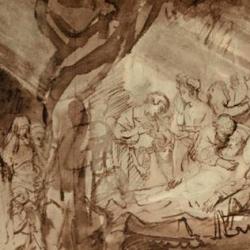In his forthcoming translation of The Writings, Strong As Death Is Love, Robert Alter argues that the writings are late. We know this because of the type of Hebrew that these books use: “Biblical Hebrew, like any language, changed through time. The temporal distance between the sundry strands of Genesis or the Book of Samuel and these Late Biblical texts is comparable to the distance between Shakespeare and John Updike. Just as in the four centuries separating Shakespeare from Updike the English language underwent pronounced changes—terms once in common usage replaced by others, palpable modifications of grammar and syntax—the Hebrew through these centuries exhibits a similar set of changes.”
Uncontroversial, but then things start reeling: “One of the books in this volume, Ruth, because it purports to take place in the period before the founding of the monarchy around 1000 BCE, deploys an archaizing style that is meant to sound like the literary Hebrew of that era. Flawless archaizing, however, is a very difficult feat to pull off, and so there is a series of small slips, perhaps as many as a dozen, where a word or idiom is used that appears only in Late Biblical Hebrew, never earlier. The Late Biblical character of the Hebrew of Jonah and Esther is more straightforward: one encounters grammatical usages, idioms, and primary items of vocabulary that are distinctively Late Biblical, some of them reflecting the Aramaic that was becoming dominant, and Esther also abounds in Persian loanwords. The Hebrew of the Song of Songs is less overtly late, probably because of the tendency of poetry to be stylistically conservative, but even here there are a few grammatical features and some terms that would not have occurred in the Hebrew in literary usage before 586 BCE.”
Sooo. Ruth includes some older forms of Hebrew; but we know that it’s a later book because it includes later Hebrew forms (the “small slips”). One has to combat the vertigo. The older Hebrew of Ruth is a literary device, rather than a clue to the book’s date; but the later Hebrew in Ruth actually shows us that the book is later. We know the book is late because of the slips, even though the rest of the book looks quite antique. Of course, the “small slips” could be taken as evidence that these forms actually existed earlier in the history of Hebrew.
The Song of Songs is late for . . . well, Alter doesn’t really say. We know it’s late even though grammar is mostly earlier because it contains some grammatical forms that are late. Again, the evidence can be turned around to become evidence for the earlier existence of these forms. Perhaps Solomon did write the Song, which would mean that the forms he used were already available to him.















